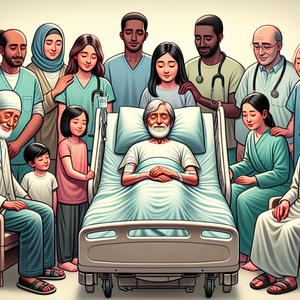The Future of Healthcare: How Cleveland Clinic Medical Assistants Are Evolving

One of the most profound changes in healthcare is the integration of technology into everyday practices. At the Cleveland Clinic, medical assistants are at the forefront of this transformation, equipped with training in advanced Electronic Health Records (EHR) systems. These systems allow for efficient patient documentation, streamlined communication among healthcare professionals, and improved patient data management. For instance, the Cleveland Clinic has implemented cutting-edge EHR systems that enable medical assistants to swiftly access patient histories, manage appointments, and coordinate follow-up care. This technological integration not only saves valuable time but also reduces the risk of errors, ultimately enhancing patient outcomes. By ensuring that patient information is accurate and readily available, medical assistants contribute significantly to the overall efficiency and safety of healthcare delivery.
Adaptation to Telehealth Services
The COVID-19 pandemic has profoundly reshaped the healthcare landscape, accelerating the adoption of telehealth services. Medical assistants at the Cleveland Clinic have played a pivotal role in this transition, facilitating virtual visits and ensuring patients receive essential care while adhering to safety protocols. In their daily roles, medical assistants are trained to guide patients through telehealth platforms, troubleshoot any technical issues, and prepare them for virtual consultations. This adaptability has been crucial in maintaining continuity of care, particularly for patients who may face barriers to in-person visits, such as mobility issues or geographical constraints. By embracing telehealth, medical assistants are helping to bridge the gap between patients and healthcare providers, ensuring that quality care remains accessible.
Emphasis on Patient-Centered Care
The Cleveland Clinic’s commitment to patient-centered care is well-known, and medical assistants serve as key advocates in this approach. Their training emphasizes empathy and communication, equipping them to engage with patients on a personal level. This focus on the patient experience is becoming increasingly vital in modern healthcare. For example, medical assistants often conduct pre-visit phone calls to assess patients' needs and expectations, which allows them to tailor care plans to individual circumstances. By actively listening to patient concerns and preferences, they foster a collaborative environment that enhances patient satisfaction and builds trust. This proactive approach is integral to the Cleveland Clinic's mission of providing personalized care, ensuring patients feel valued and involved in their healthcare journey.
Continuous Professional Development
In an industry that is constantly evolving, continuous professional development is essential for medical assistants to remain effective and knowledgeable. The Cleveland Clinic recognizes this need and offers a variety of specialized training programs and certifications in areas such as chronic disease management, advanced clinical skills, and pharmaceutical knowledge. For instance, medical assistants who pursue certification in chronic care management are better equipped to educate and support patients in managing their conditions. This investment in professional growth not only enhances the skills of medical assistants but also improves the overall quality of care provided to patients. By fostering a culture of learning and development, the Cleveland Clinic ensures that its medical assistants are well-prepared to meet the challenges of an ever-changing healthcare landscape.
The role of medical assistants at the Cleveland Clinic is evolving rapidly in response to technological advancements and changing healthcare practices. By embracing new technologies, adapting to telehealth services, prioritizing patient-centered care, and engaging in continuous professional development, these professionals are shaping the future of healthcare. Their ability to navigate this dynamic landscape is crucial not only for their own career advancement but also for the overall improvement of patient care. As the healthcare industry continues to transform, medical assistants will undoubtedly remain at the forefront, ensuring that patients receive the highest standard of care in an increasingly complex environment. The Cleveland Clinic stands as a beacon of innovation, demonstrating how medical assistants can evolve to meet the needs of patients and the healthcare system as a whole.
Telehealth Coordinator
Telehealth companies, hospitals with telemedicine departments, healthcare systems like Cleveland Clinic
Core Responsibilities
Manage and facilitate telehealth appointments, ensuring patients are prepared and informed about the process.
Troubleshoot technical issues related to telehealth platforms during patient consultations.
Collaborate with healthcare providers to streamline telehealth workflows and improve patient access to care.
Required Skills
Proficiency in telehealth technology and electronic health record systems.
Strong communication skills to guide patients through the virtual care experience.
Experience in healthcare settings, particularly with remote patient monitoring or telemedicine.
Clinical Medical Assistant
Hospitals, outpatient clinics, specialized healthcare practices
Core Responsibilities
Assist healthcare providers during patient examinations and procedures, ensuring a smooth clinical workflow.
Perform basic laboratory tests, administer injections, and manage patient vitals.
Educate patients on treatment plans and follow-up care to enhance understanding and compliance.
Required Skills
Certification as a Medical Assistant (CMA) or Registered Medical Assistant (RMA).
Knowledge of clinical procedures and patient care protocols, including infection control measures.
Strong organizational skills to manage multiple tasks effectively in a fast-paced environment.
Health Informatics Specialist
Healthcare organizations, IT consulting firms, government health departments
Core Responsibilities
Analyze and manage health information systems to improve patient care and streamline workflows.
Collaborate with IT departments to implement and optimize electronic health record (EHR) systems.
Ensure compliance with healthcare regulations related to data privacy and security.
Required Skills
Strong analytical skills and proficiency in data management and reporting tools.
Familiarity with healthcare standards and regulations, such as HIPAA.
Background in healthcare, nursing, or information technology, with a focus on health informatics.
Patient Care Advocate
Hospitals, healthcare systems, patient advocacy organizations
Core Responsibilities
Serve as a liaison between patients and healthcare providers, ensuring patients' needs and concerns are addressed.
Assist patients in navigating the healthcare system, including scheduling appointments and understanding insurance coverage.
Collect and analyze patient feedback to improve service delivery and patient satisfaction.
Required Skills
Excellent interpersonal and communication skills to build rapport with patients and healthcare teams.
Knowledge of healthcare policies, insurance processes, and patient rights.
Experience in customer service or a healthcare-related field.
Chronic Disease Management Specialist
Health clinics, community health organizations, hospitals focusing on chronic disease programs
Core Responsibilities
Develop and implement care plans for patients with chronic conditions, focusing on education and self-management.
Monitor patient progress and adjust treatment plans in collaboration with healthcare providers.
Conduct group education sessions and workshops to promote lifestyle changes and disease prevention.
Required Skills
Certification in chronic disease management or related fields.
Strong understanding of chronic illnesses and their impact on patient health.
Ability to engage and motivate patients to adopt healthier behaviors.


